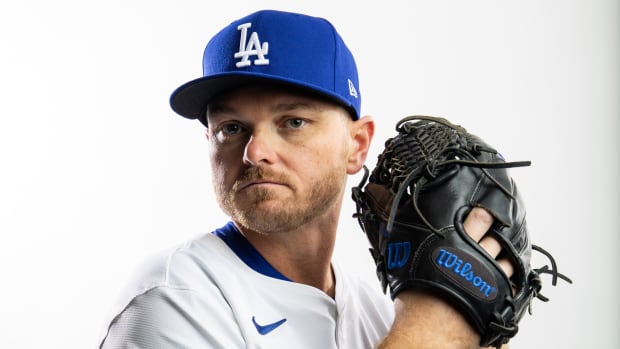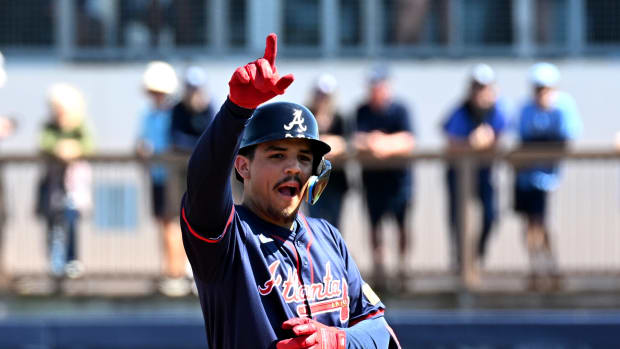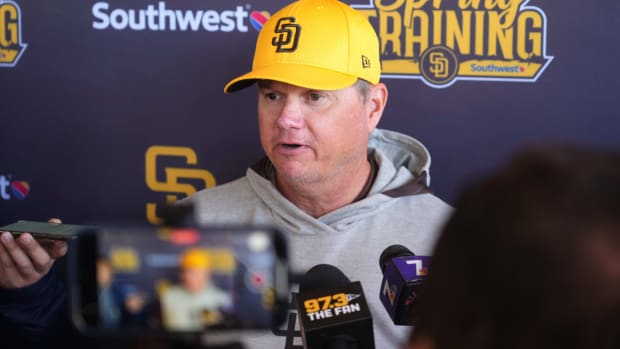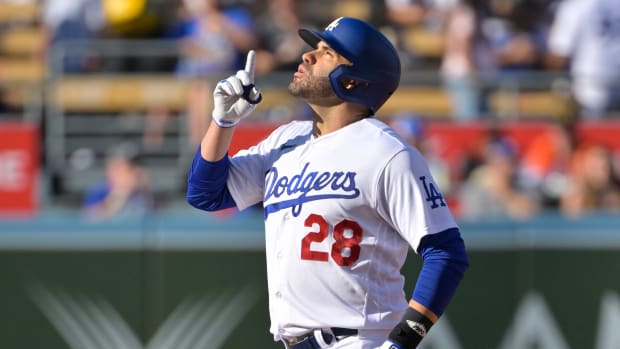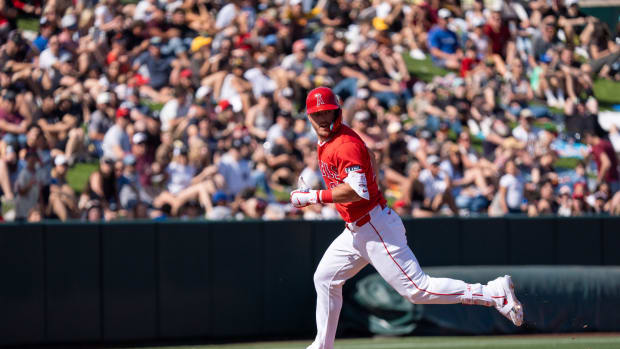Dodgers' Dream Season Crashes at the Finish Line: 'I Feel Like We Were the Best Team'
LOS ANGELES—The lasting image of this World Series was supposed to have been the embrace shared by two broad-backed lefties—one slightly stooped, the other raggedy-maned, but both now free of the weight of a team and a city. That it would have to happen after the first Game 7 played at Dodger Stadium seemed almost more poetic. Sandy Koufax threw the first pitch on Wednesday night, and Clayton Kershaw was going to throw the last.
Instead the flashes seared on Dodgers’ fans memories will be of downcast heads and slow trudges off the field. The Astros won 5–1 to claim their first World Series title. Winter will be cold in L.A.
There will be plenty of snapshots from a hollow November night in Chavez Ravine: first baseman Cody Bellinger glumly chewing gum on the bench in the first inning after his errant throw cost at least one run; righty Yu Darvish slogging toward the dugout as boos echoed through the stadium after another five-out start; rightfielderYasielPuig slamming his bat into the dirt upon extinguishing a fifth-inning rally with a pop-up.
YOUR 2018 CHAMPS: Why the Astros Will Repeat Next Season as World Series Champions
And then there were the private moments, just as indelible to those who witnessed them. Kershaw, limbering in the bullpen in the top of the second, heard a sudden rush of air from the crowd. He peeked around the door to watch Houston centerfielder George Springer circling the bases with a back-breaking home run to put his team up 5–0. The greatest pitcher of his generation, the Atlas tasked with bringing the Dodgers their first title in nearly three decades, the competitor who wants so desperately to prove that he is just as elite in October as he is through September, sighed and returned to warming up.
Reliever Brandon Morrow, brought in for his seventh straight World Series appearance but this time too late to do much good, slumped on the bench as the final out settled into Astros first baseman Yuli Gurriel’s glove. He watched as his old friend Alonzo Powell, the assistant hitting coach, celebrated with a bunch of guys for whom Morrow did not feel particularly happy. He didn’t watch to make himself miserable, exactly, nor did he quite watch to motivate himself. A man who did not make the roster in spring training didn’t need motivation. He just wanted to bear witness.
An hour after the game ended, infielder Charlie Culberson wandered around an emptying clubhouse in full uniform and spikes, willing the season to continue, to give the Dodgers just one more shot.
This was not how it was supposed to end. “I feel like we were the best team,” said Game 6 starter Rich Hill, looking ashen. “I wish there had been more,” Morrow told someone who asked if he felt taxed by the end of the month. “One pitch here, one pitch there … ” said Kershaw softly, as reporters crowded around him to ask whether he was sad his team had just lost the only thing that still eludes him.
After such a competitive series—the aggregate score was 34–34—Game 7 began with a bang and ended with a whimper. Darvish gave up a leadoff double to Series MVP Springer, then watched Bellinger for the second time this week attempt to make a play on a ball that really should have been the second baseman’s. The throw sailed over Darvish’s head at first as Springer raced home. The first two hitters reached in the second, and it seemed the Dodgers might escape until Springer lined that ball into the centerfield stands. For the second time in two World Series starts, Darvish departed after an 1 2/3 innings.
One issue the first time around was the baseballs, which players said were slicker in the World Series than they had been in the regular season. Pitchers who throw sliders were disproportionately bothered by the change; the smooth surface made it hard to apply a consistent grip to that pitch. Darvish had thrown his bullpen session before Game 3 with a regular-season ball and said he was struck by the difference once the first inning began. His slider is his best pitch, and he needs it to bite as expected to set up the rest of his offerings. But this time he purposely practiced with game balls, and the results were the same.
Darvish was certainly not the only pitcher affected. He just seemed to be the only one who couldn’t adjust. Astros reliever Brad Peacock, who also relies heavily on sliders, cut his usage of the pitch in half from his first World Series appearance to his second, pumping in sinkers and four-seamers instead. He allowed one run in seven innings after making the change. Houston starter Justin Verlander, who inspected the balls as he received them and tossed back any he did not like, kept his sliders mostly down in the zone in Game 6 after feeling he could not control the ball in Game 2. He looked nearly unhittable, eventually giving up two runs in six innings.
WATCH: Astros Clinch First World Series Title in Franchise History
In the end, Darvish’s performance might not have been the difference. Morrow, who extinguished the second-inning threat but was removed when his spot came up in the batting order, got that last out. Kershaw—four scoreless innings on two days’ rest—closer Kenley Jansen and Game 4 starter Alex Wood combined to shut out Houston over the final 7 1/3 innings. And the hitters did just about nothing.
It’s not as if they didn’t have their chances. They seemed to put two men on every inning and leave them there, shaking their heads as teammates brought them their gloves. Weak contact, shattered bats, flailing strikeouts—in the end they stranded 10. A funereal Dodger Stadium could barely rouse itself for the occasional meek Let’s go, Dod-gers. The fans and the players alike had nearly nine innings to come to terms with the result.
And yet after it was over—after they filed quietly through the tunnel and let Roberts tell them not to hang their heads—they still seemed bewildered by the suddenness. There will not be much sleep tonight among these 25.
George Springer Named World Series MVP After Five-Homer Effort
Bellinger, a hero all season who struck out in seven of his last eight at bats, stared blankly into his locker, a towel wrapped around his waist, and tried to process the crushing end of the first season of his career. “I don’t know what to do,” he told no one in particular. “I don’t know what to pack.” He sighed. “I need a trash bag.”
This was a spectacular World Series. Five of the first six games were decided by fewer than three runs, and the outlier, Game 4, was tied 1-1 entering the ninth inning. Even an anticlimactic Game 7 could not detract from a staggering, stunning, thrilling 10 days of baseball. The series featured 23 lead changes and 16 game-tying or go-ahead home runs. No lead felt safe. No game felt over.
The biggest moments—Turner’s dinger to ice Game 1, any of the record five extra-inning shots in Game 2, Springer’s home run robbery in Game 3, Wood’s five no-hit innings in Game 4, Bregman’s 10th-inning single in Game 5, Jansen’s six dominant outs in Game 6, Seager’s grounder to second to end Game 7—will star on highlight reels ad infinitum. We will replay this World Series forever. So will the Dodgers.






























